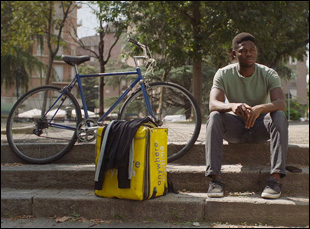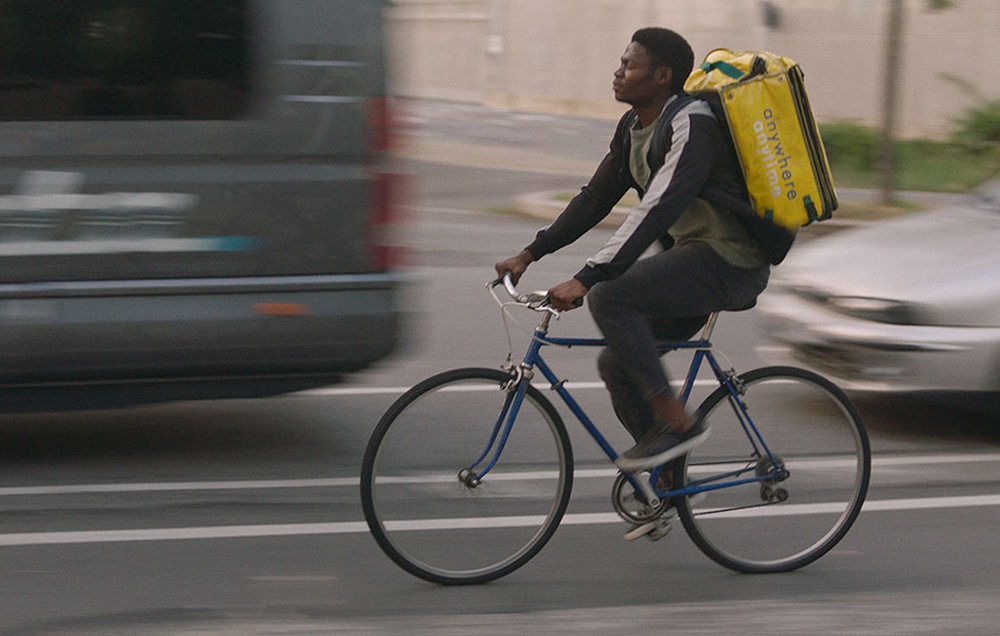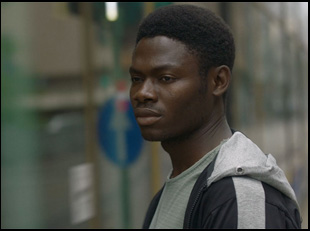It’s frightening how little it takes to throw off the entire life of an immigrant in “Anywhere Anytime,” making it seem like destiny that Issa (Ibrahima Sambou) eventually finds his way onto a bike to make deliveries with all he’s had to balance already. Of course, there are more upsetting reasons why that’s his only option for employment, having been unceremoniously dismissed from his previous work of helping out a farmer bring his produce to market after having a brush with authorities that’s a little too close for comfort, but to see him glide through the streets of Turin so effortlessly after what it must’ve taken him to get there in the first place from Senegal shows a strength of will that few can even fathom.
Still, the small things that test Issa on a daily basis become big dramatic moments in Milad Tangshir’s compelling character study when Issa has his bike stolen and must find a way to get it back, a particularly onerous task when it’s the only way he can make income and he already borrowed money to pay for the bike in the first place. Tangshir doesn’t shy away from comparisons to one of the most towering achievements of Italian cinema in Vittorio de Sica’s “The Bicycle Thieves,” but even with a similar premise, it can’t help but look different when the director is clearly pulling from a number of influences outside of Italy, having moved there as an immigrant himself from Tehran and rethinks its tradition of neorealism in the wake of a country that has been reshaped by all the different cultures that have made it into a melting pot over the past century.
Literally jazzed up with a vibrant soundtrack of ‘60s Afrobeat, the film has the breezy attitude like the one Issa has to adopt to get through such difficult days, yet it follows the courier on a treacherous path as he tangles with underground thugs that make their own living reselling bikes that they’ve lifted from the streets, evades authorities who could send him home for being undocumented and bears the responsibility of sharing the money he does make with relatives that he may never be able to see with his own eyes again. Even if the camera didn’t have a little bit of a mind of its own as it floats around Issa, trying to keep up with him racing around, Tangshir is able to see things in his experience that his lead doesn’t, both in terms of threats to his safety and his strength and after a rigorous research process in which the director became intimately familiar with the Senegalese community in Turin, the film, which boasts a largely nonprofessional cast including its star Sambou, is pulsing with life, not only in a commitment to authenticity, but in the energy it carries.
In the midst of a whirlwind fall festival run beginning in Venice and moving onto Toronto before returning home to Turin for its local film fest this past week, Tangshir and Sambou graciously sat down to talk about the moving drama, why the director hoped his star wouldn’t arrive with his usual level of physical fitness, and how ignoring the generally gritty aesthetic in which such stories are usually told could be more true to its subject.
Milad Tangshir: It was 2018 when I got close to this world of riders. It was a relatively new phenomenon in Italy, so I was interested in it because it was the last possibility sometimes for the marginalized and for the immigrants that were coming, it was the first. That meeting point was interesting. Also a characteristic of gig economy jobs is that they’re almost absent of individuality, so I just went for a whole summer with a young Senegalese rider to do the deliveries and wait [with them] in the streets, in the restaurant, and I just deepened my knowledge. Obviously I was struck by the fact that the simple object of the bicycle could change the life of some of them and that was the starting point for everything.
Ibrahima Sambou: And I got a call from my adopted Italian mom who introduced me to Milad…
Milad Tangshir: I knew that I couldn’t find the right actor — I had to find the right person. So for two years, I went through all the associations, immigrant projects and dormitories and met [around] 200 guys one after another and at a certain point, I encountered Ibra. It was fortunate for me because he’s present in almost every shot of the film and all the film is on his shoulders. I just trusted my gut and the [conversation] that we had, and it worked out well.
Ibrahima Sambou: Yeah, it was a little bit hard for me because I’ve never experienced being an actor before. Every time he called me, I was like, “I’m not an actor,” but he said, “You’ve just got to try it.” But I liked it also because I have a lot of friends going through the same story as riders in Italy, so I could be [helping to tell] a story for those who don’t have a voice.
Was the story pretty well developed before Ibrahima came aboard or did it change once you knew you’d be working together?
Milad Tangshir: It was pretty much fixed, but almost the whole cast was from the streets and I was completely open to what they could bring to the table. I was fortunate that [Ibrahima] also is a very precise person and I was happy he could execute that what I had in mind, but I was aware that if I was going to go with non-actors, I had to be at their disposal and not vice versa.
The most important thing [Ibrahima and I] did was to have a long conversation about his biography. Maybe Issa was 9 or 10 years old and 14 when he started his journey towards Europe alone, and we saw that [Ibrahima] has personally gone through many of the same points, so we just made a map of his personal experiences related to the screenplay just to recall the emotions. We had few days of rehearsals for some dialogue scenes that are now not so many in the film, but I think [they benefitted] the dialogue [now in the film], counting on his own memories and just be able to recall what he has lived, but at the same time knowing the difference between [the character and] Ibra.
Ibrahima Sambou: Yeah, maybe Milad did this movie, but I was going through this every single day. I have a friend of mine who is [a delivery person] also. He always came and complained to me every time, so this movie is real.
One of the things I really liked in this was how the camera could follow Issa, but at the same time had a mind of its own at times, wandering off a bit to look around a corner. How did you figure out how movement would work in this?
Milad Tangshir: Yeah, I don’t believe that [when] talking about a poor person, it should have to be visually poor, and I didn’t have an invisible camera. I was aware that I am not him and there is a distance between the eye of the film [and the character in the film]. I believe in that distance for many reasons, so it was written in the screenplay and one thing that convinced me to do the film was that I could have my own voice also through the mise-en-scene or the camera movements. It’s about how you walk with him and how you stay and spend time with him. I think the camerawork and the compositions give dignity to his story and I didn’t want to be invisible like [observing from] over his shoulder. I wanted to be in the street with a non-actor, but a clear idea visually of how you’re going to tell this story.
There must’ve been some crazy days of filming when you’re in the middle of some large crowds, such as the market and the soup kitchen. What was it like?
Milad Tangshir: Yeah, the scene when his bicycle gets stolen and he runs after so we that day he just tore something up in his [leg]…
Ibrahima Sambou: Yeah, I was running a lot and also riding the bicycle…

Ibrahima Sambou: Yeah, [the injury] was [Milad’s] fault because he told me that don’t go to the gym. [laughs]
Milad Tangshir: Because as you see he’s very well-built, so a month before shooting, I said “Don’t go anymore” because if you’re [too strong], you’re going to just kick all the [bad guys] and get the bike back. It doesn’t make any sense. You’re too big.” [laughs] “So please don’t go anymore to the gym.”
Ibrahima Sambou: I was like okay, even though I always go to the gym and I stayed home a whole month without doing anything. [But then] just imagine, in one single day, they told you you were going to run 200 meters six or seven times [in a row]. It was [a bit] hard for me.
It had to be hard to follow with a camera too…
Milad Tangshir: We had to learn to dance with him. As I mentioned, it’s a wandering film, so I was drawn to the idea of just walking and wandering through this city. It’s a crazy pyramid [where you think] I’m going to walk all day till I find my bus. It’s completely insane, so I knew it’s about moving in the space with him, and I wanted to to have all the options available to be on the tripod, fix the composition and just walk with him or run with him.
For years, I wandered with my bicycle to choose the locations. Many scenes were written based on the location. We had almost 50 locations, so it was hard for the production of the film, but the city for me is the co-protagonist. It had to be those locations, especially when in Italian cinema, Torino is absent. It is famous for its baroque representation everywhere in the world. It’s nearly anonymous — it can be in Belgium or in France and they come to shoot to represent Rome or Vienna, but the city that we live in is completely another one.
The music becomes really compelling in that way — it has a real multicultural vibrancy to it. How did you work on the soundtrack?
Milad Tangshir: The music was the first thing that came — even before a screenplay, actually. I wrote the film listening to that [music]. I had this idea of using this Afro-Cuban jazz of late ’60s and early ’70s from Senegal and Ethiopia because from one hand, they had this jazz sound which is familiar to the Western ears, and on the other, they had just the color of the African and African sonority that [speaks] to the origins of the character. So I had this idea of putting that on the Italian streets. I was just looking for a sense of alienation to be [closer] with him, by taking away the familiarity of those streets and stories about immigrants from the Western audience. That choice of music also underlines that he has a voice and his character is the one that decides [his own fate and] makes everything go forward.
What is it like getting the film to this moment where you’re traveling the world with it?
Ibrahima Sambou: I got emotional. I had never watched the film since we shot it…
Milad Tangshir: He watched it first time at Venice…
Ibrahima Sambou: He always told me, “Maybe one day we see the film together before it comes out” and I [would say], “No, no, I will wait until we finish. We’ll see it together.”
Milad Tangshir: I can say that the shock for him was watching the thing put together.
Ibrahima Sambou: Yeah, I had goosebumps because I’ve never experienced something like that before. [Seeing] myself on that big screen 30 meters [tall], I was like, “Oh, I did this thing,” and [seeing myself] was like another experience for me.
Milad Tangshir: Yeah, he had that moment in Venice because like his character in the film, Ibra is contained [with his emotions]. He just takes it in and takes it in and for the first time after two years of [production], he saw it together and the story of himself and the stories that he knows and it finally was all just let out there.
Was it particularly meaningful to show it in Italy?
Milad Tangshir: Yeah, the Venice screenings were very overwhelming. It was an honest and sincere reaction and somebody had written that it’s an Italian film almost without Italians and it was the film representing Italy in the competition of the six, so I’m happy to have this opportunity to express ourselves as the director and the lead actor both being immigrants. And when we come back from Toronto to Italy, it will be our first presentation in Turin, the city that we shot the film, so I really can’t wait. That’s the real moment of giving back to the streets and to the community.
Ibrahima Sambou: Yeah, I feel relieved. If you have something in you, you cry on your pillow. You have no voice to spread it and to express yourself. But this movie permits me to help those who don’t have the voice to spread it for themselves. I’ve lived in Italy for nine years, so I’ve seen a lot of things and I know what it’s like to survive alone. You live alone without your family, without your friends, so it’s very hard.
Do you think you’d want to act again after this experience?
Ibrahima Sambou: Yeah, absolutely, I want to do more.
Milad Tangshir: He’s the new Denzel. [laughs]
Ibrahima Sambou: I wish to, because Denzel is an example for every actor.
“Anywhere Anytime” does not yet have U.S. distribution.





